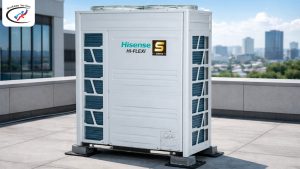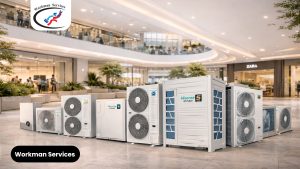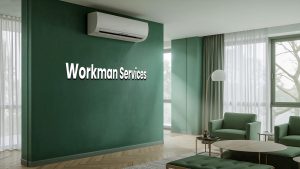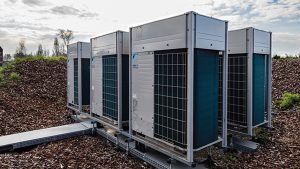Table of Contents
ToggleAHU vs FCU: Complete Guide to Air Handling and Fan Coil Units
When designing HVAC systems for modern buildings, the AHU vs FCU debate often becomes central to creating effective climate control solutions. Understanding the fundamental differences between Air Handling Units (AHU) and Fan Coil Units (FCU) is crucial for making informed decisions about your building’s comfort systems.
Both AHU and FCU systems serve essential roles in maintaining indoor air quality and temperature control, yet they operate differently and suit various applications. Whether you’re planning a commercial installation or upgrading existing systems, knowing when to choose AHU over FCU can significantly impact energy efficiency, maintenance costs, and overall performance.
This comprehensive guide explores the AHU vs FCU comparison, examining their unique features, applications, and benefits. We’ll help you determine which system best meets your specific requirements while highlighting why workmanservices.com.pk stands as Pakistan’s premier destination for professional-grade HVAC solutions.
Understanding Air Handling Units (AHU)
Air Handling Units represent centralized HVAC components that condition and circulate air throughout buildings. These comprehensive systems typically include heating coils, cooling coils, filters, fans, dampers, and controls within a single enclosure. AHU systems process large volumes of air, making them ideal for commercial and industrial applications.
Modern AHU units for commercial buildings incorporate advanced filtration systems, variable-speed drives, and intelligent controls that optimize energy consumption while maintaining precise environmental conditions. These sophisticated systems can handle multiple zones simultaneously, providing consistent comfort across large spaces.
The versatility of AHU systems extends to their configuration options. Modular designs allow customization based on specific building requirements, climate conditions, and performance expectations. This flexibility makes AHU units for commercial buildings suitable for diverse applications, from office complexes to manufacturing facilities.
Key Components of AHU Systems
Air Handling Units integrate multiple components working together to process and distribute conditioned air. The main housing contains supply and return fans that move air through the system. Heat recovery wheels or plate exchangers can capture energy from exhaust air, improving overall system efficiency.
Filtration systems within AHU units range from basic particulate filters to advanced HEPA and activated carbon filters for superior air quality. These comprehensive filtration capabilities make AHU units for commercial buildings essential for environments requiring strict air purity standards, such as hospitals, laboratories, and pharmaceutical facilities.
Control systems in modern AHU installations utilize building automation protocols to optimize performance. These intelligent systems monitor indoor conditions, outdoor weather, and occupancy patterns to adjust airflow, temperature, and humidity automatically. Such advanced features contribute to the growing demand for energy-efficient AHU systems across various industries.
Fan Coil Unit (FCU) Fundamentals
Fan Coil Units operate as decentralized HVAC components that provide localized heating and cooling for individual spaces or zones. Unlike centralized AHU systems, FCU units are typically smaller, self-contained devices installed within or near the spaces they serve. This distributed approach offers distinct advantages for certain applications.
FCU systems consist of a fan, heating and cooling coils, and basic controls within a compact housing. These units connect to central chilled water and hot water systems, receiving conditioned water to heat or cool the air circulated within their designated zones. This design provides individual temperature control for different areas within a building.
The simplicity of FCU design contributes to their popularity in hospitality, residential, and small commercial applications. Individual room control allows occupants to adjust temperatures according to their preferences, potentially reducing energy consumption in unoccupied spaces. This localized control makes FCU systems particularly attractive for hotels, apartments, and office buildings with varying occupancy patterns.
FCU Installation and Configuration Options
Fan Coil Units offer various installation configurations to suit different architectural requirements and space constraints. Ceiling-mounted units work well in spaces with limited floor area, while floor-standing models provide easy access for maintenance. Concealed units can be integrated into ceiling plenums or wall cavities for aesthetic considerations.
Water connections to FCU systems require careful planning to ensure adequate flow rates and temperature differentials. Two-pipe and four-pipe configurations offer different levels of flexibility, with four-pipe systems providing simultaneous heating and cooling capabilities. These installation considerations affect both initial costs and long-term performance.
Control options for FCU systems range from simple thermostats to sophisticated building automation interfaces. Advanced controls can integrate multiple FCU units into centralized management systems, providing facility managers with comprehensive monitoring and optimization capabilities while maintaining individual zone control.
AHU vs FCU: Performance Comparison
The AHU vs FCU performance debate centers on several critical factors including energy efficiency, maintenance requirements, and operational flexibility. AHU systems excel in applications requiring large airflow volumes, precise air quality control, and centralized management. Their ability to incorporate heat recovery, advanced filtration, and sophisticated controls makes them ideal for complex commercial applications.
FCU systems shine in scenarios requiring individual zone control, lower initial installation costs, and simplified maintenance procedures. The distributed nature of FCU installations means individual unit failures don’t affect entire buildings, providing inherent redundancy that AHU systems cannot match.
Energy-efficient AHU systems typically achieve better overall building performance through centralized optimization, heat recovery, and variable-speed operation. However, FCU systems can reduce energy consumption through precise zone control, allowing unoccupied areas to operate at setback temperatures without affecting occupied spaces.
Maintenance and Operational Considerations
Maintenance requirements differ significantly between AHU and FCU systems. Centralized AHU systems consolidate maintenance activities, allowing technicians to service multiple building zones from a single location. This centralization can reduce labor costs and simplify preventive maintenance scheduling.
FCU systems require distributed maintenance efforts, with technicians accessing individual units throughout the building. While this approach may increase labor requirements, it also allows targeted maintenance without affecting other building areas. Individual FCU failures don’t compromise entire HVAC systems, providing operational advantages in critical applications.
Filter replacement, coil cleaning, and component inspection procedures vary between AHU and FCU systems. Energy-efficient AHU systems often incorporate automated monitoring systems that alert facility managers to maintenance needs, while FCU systems typically rely on scheduled inspections and occupant feedback.
Commercial Applications: When to Choose AHU
AHU units for commercial buildings excel in large-scale applications requiring consistent environmental conditions across multiple zones. Office buildings, shopping centers, hospitals, and educational facilities benefit from the centralized control and comprehensive air processing capabilities that AHU systems provide.
Industries with strict air quality requirements often specify AHU systems due to their superior filtration capabilities and precise environmental control. Pharmaceutical manufacturing, electronics assembly, and food processing facilities rely on energy-efficient AHU systems to maintain the sterile conditions necessary for their operations.
Buildings with high occupancy densities benefit from AHU systems’ ability to provide adequate ventilation while maintaining energy efficiency. The heat recovery capabilities common in modern AHU installations help offset the energy costs associated with processing large volumes of outdoor air for ventilation purposes.
AHU System Sizing and Selection
Proper AHU sizing requires comprehensive load calculations considering building envelope characteristics, occupancy patterns, and internal heat gains. Professional engineers analyze these factors to specify appropriate airflow capacities, cooling and heating loads, and filtration requirements for optimal system performance.
AHU systems for sale come in various configurations and capacities to match different application requirements. Modular designs allow future expansion or modification as building needs change. This flexibility makes AHU systems attractive for facilities anticipating growth or changing operational requirements.
Selection criteria for energy-efficient AHU systems include equipment efficiency ratings, control capabilities, and integration potential with existing building management systems. These factors significantly impact long-term operational costs and should receive careful consideration during the specification process.
FCU Applications and Benefits
FCU systems work exceptionally well in hospitality applications where individual room control is essential. Hotels, resorts, and residential buildings benefit from the personalized comfort control that FCU systems provide. Guests can adjust temperatures to their preferences without affecting other rooms or common areas.
Retrofit applications often favor FCU systems due to their minimal infrastructure requirements compared to centralized AHU installations. Existing buildings with limited space for ductwork can accommodate FCU systems more easily, making them popular choices for renovation projects.
Mixed-use buildings with diverse occupancy patterns find FCU systems particularly advantageous. Retail spaces, offices, and residential areas within the same building can operate independently, allowing optimized energy consumption based on specific usage patterns and schedules.
FCU System Design Considerations
Water system design for FCU installations requires careful attention to flow rates, temperature differentials, and pump sizing. Properly designed systems ensure adequate heating and cooling capacity while minimizing energy consumption. Variable-speed pumping systems can further enhance efficiency by matching water flow to actual demand.
Condensate drainage from FCU cooling operations requires appropriate design consideration to prevent water damage and maintain indoor air quality. Proper drainage systems, insulation, and maintenance access are essential for long-term FCU system reliability.
Room-by-room load calculations help determine appropriate FCU capacities for different spaces. Oversized units waste energy and provide poor humidity control, while undersized units cannot maintain comfortable conditions during peak load periods.
Cost Analysis: AHU vs FCU Investment
Initial installation costs vary significantly between AHU vs FCU systems, depending on building size, complexity, and performance requirements. AHU systems typically require higher upfront investments due to centralized equipment costs, extensive ductwork, and sophisticated control systems. However, these systems often provide better long-term value through energy efficiency and operational benefits.
FCU systems generally offer lower initial costs, especially in buildings with existing water distribution systems. The distributed nature of FCU installations allows phased implementation, spreading costs over time. This financial flexibility appeals to developers and building owners with budget constraints.
Operating costs depend on energy prices, maintenance requirements, and system utilization patterns. Energy-efficient AHU systems often achieve lower operating costs through heat recovery, optimized controls, and centralized maintenance. FCU systems can reduce costs through zone-based control and selective operation of unused areas.
Long-term Value Considerations
Equipment lifecycle costs include initial purchase, installation, maintenance, energy consumption, and eventual replacement expenses. AHU systems for sale typically offer longer service lives than individual FCU units, potentially providing better long-term value despite higher initial costs.
Energy efficiency improvements in modern HVAC systems significantly impact operating costs over equipment lifecycles. Energy-efficient AHU systems with heat recovery, variable-speed drives, and intelligent controls can reduce energy consumption by 30-50% compared to conventional systems.
Maintenance cost analysis should consider both routine service requirements and major component replacements. Centralized AHU systems may offer maintenance cost advantages through consolidated service activities, while FCU systems provide redundancy benefits that can reduce emergency service costs.
Why Choose workmanservices.com.pk for AHU Systems
When searching for reliable AHU systems for sale, workmanservices.com.pk stands as Pakistan’s premier destination for professional HVAC solutions. Their extensive experience in commercial and industrial applications ensures you receive expert guidance throughout your system selection and installation process.
workmanservices.com.pk offers comprehensive AHU systems for sale from leading international manufacturers, ensuring quality, reliability, and performance that meets demanding commercial requirements. Their technical team understands local climate conditions and building codes, providing solutions specifically tailored to Pakistani market needs.
The company’s commitment to customer satisfaction extends beyond equipment sales to include professional installation, commissioning, and ongoing support services. This comprehensive approach ensures your energy-efficient AHU systems operate at peak performance throughout their service lives.
Technical Expertise and Support
workmanservices.com.pk employs certified HVAC professionals with extensive experience in AHU system design, installation, and maintenance. Their technical expertise ensures proper system sizing, selection, and integration with existing building infrastructure.
Customers can buy AHU online through workmanservices.com.pk’s user-friendly platform, accessing detailed product specifications, performance data, and pricing information. Their online tools help streamline the selection process while ensuring you choose the most appropriate system for your specific application.
Post-installation support includes commissioning services, operator training, and preventive maintenance programs designed to maximize system performance and longevity. This comprehensive support structure protects your investment and ensures optimal operation of your energy-efficient AHU systems.
Quality Assurance and Warranty
workmanservices.com.pk partners with reputable manufacturers to provide high-quality AHU systems for sale backed by comprehensive warranties and technical support. Their quality assurance processes ensure every system meets rigorous performance standards before delivery and installation.
When you buy AHU online from workmanservices.com.pk, you benefit from their established supplier relationships and bulk purchasing power, often resulting in better pricing than dealing directly with manufacturers. This cost advantage, combined with their technical expertise, provides exceptional value for your investment.
The company’s reputation for reliability and professional service has made them the preferred choice for major commercial and industrial projects throughout Pakistan. Their track record demonstrates consistent delivery of successful HVAC installations that meet or exceed customer expectations.
Conclusion
The AHU vs FCU decision ultimately depends on your specific application requirements, budget constraints, and performance objectives. AHU systems excel in large commercial applications requiring centralized control, superior air quality, and energy efficiency. FCU systems provide advantages in applications needing individual zone control, lower initial costs, and installation flexibility.
Energy-efficient AHU systems offer compelling benefits for facilities prioritizing long-term operational efficiency and environmental responsibility. Their advanced features, including heat recovery and intelligent controls, can significantly reduce energy consumption while maintaining superior indoor environmental quality.
For reliable AHU systems for sale and expert technical guidance, workmanservices.com.pk provides the expertise, quality products, and comprehensive support necessary for successful HVAC installations. Their commitment to customer satisfaction and technical excellence makes them the ideal partner for your commercial HVAC needs.
Whether you choose to buy AHU online or require on-site consultation, workmanservices.com.pk offers the resources and expertise to ensure your HVAC investment delivers optimal performance and value for years to come.






